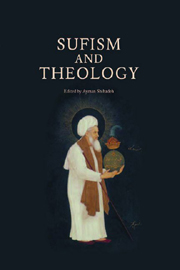Book contents
- Frontmatter
- Contents
- Contributors
- Acknowledgements
- Introduction
- Part I Mystical Theologies
- 1 Mystical Theology and the Traditionalist Hermeneutics of Maybudī's Kashf al-Asrār
- 2 The All-Comprehensive Circle (al-Iḥāṭa): Soul, Intellect, and the Oneness of Existence in the Doctrine of Ibn Sab'īn
- 3 One Aspect of the Akbarian Turn in Shī'ī Theology
- 4 Sufism and Theology in the Confessions of Ṣā'in al-Dīn Turka Iṣfahānī (d. 830/1437)
- 5 A Sufi Theology Fit for a Shī'ī King: The Gawhar-i Murād of 'Abd al-Razzāq Lāhījī (d. 1072/1661–2)
- Part II Theological Approaches to Sufism
- Index
2 - The All-Comprehensive Circle (al-Iḥāṭa): Soul, Intellect, and the Oneness of Existence in the Doctrine of Ibn Sab'īn
from Part I - Mystical Theologies
Published online by Cambridge University Press: 12 September 2012
- Frontmatter
- Contents
- Contributors
- Acknowledgements
- Introduction
- Part I Mystical Theologies
- 1 Mystical Theology and the Traditionalist Hermeneutics of Maybudī's Kashf al-Asrār
- 2 The All-Comprehensive Circle (al-Iḥāṭa): Soul, Intellect, and the Oneness of Existence in the Doctrine of Ibn Sab'īn
- 3 One Aspect of the Akbarian Turn in Shī'ī Theology
- 4 Sufism and Theology in the Confessions of Ṣā'in al-Dīn Turka Iṣfahānī (d. 830/1437)
- 5 A Sufi Theology Fit for a Shī'ī King: The Gawhar-i Murād of 'Abd al-Razzāq Lāhījī (d. 1072/1661–2)
- Part II Theological Approaches to Sufism
- Index
Summary
The Andalusian philosopher and mystic ‘Abd al-Ḥaqq ibn Sab’īn (d. 669/1270) is one of the most misunderstood figures in the history of Islamic thought. Most pre-modern Muslim writers portrayed him as the epitome of whatever they considered wrong with mysticism. Ibn Khaldūn (d. 808/1406), for example, described him as a radical monist whose ideas constituted ‘overt heresy and unwarranted innovations, and to justify them, the most extravagant and detestable interpretations of the literal meaning of orthodox doctrine’. Nearly everything that has been written about Ibn Sab'īn is problematical. His name, his ethnic origin, his morals, his honesty, and even the means of his death have been called into question. He has been called a plagiarist, a seducer of women, and the author of pedantic and unintelligible writings. However, he has also been described as the author of works ‘the likes of which no one has ever seen’ and, according to at least one account, he was an accomplished physician who fashioned a prosthetic skullcap for the Sharīf of Mecca. The historian Aḥmad al-Ghubrīnī (d. 703/1304), who relied on accounts about Ibn Sab'īn that were related by his associates in the eastern Algerian city of Bijāya, tells of the Andalusian mystic's impressive rhetorical skills, his eloquence, and his remarkable fluency in the Arabic language. Ghubrīnī also praises Ibn Sab'īn's wisdom, intelligence, and piety, and claims that when he eventually moved to Mecca, pilgrims from the Islamic West sought him out like no one else.
- Type
- Chapter
- Information
- Sufism and Theology , pp. 31 - 48Publisher: Edinburgh University PressPrint publication year: 2007



